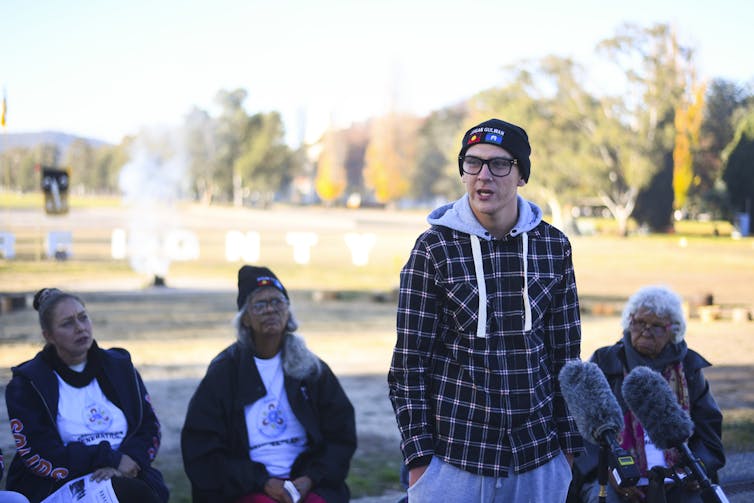High Court rules media are liable for Facebook comments on their stories. Here's what that means for your favourite Facebook pages
- Written by David Rolph, Professor of Law, University of Sydney
A publisher can be held responsible for defamatory comments readers leave on its Facebook pages, the High Court ruled today[1], in a decision that could have far-reaching consequences for social media users throughout Australia.
This decision may mean anyone who runs a social media page can theoretically be sued over disparaging comments posted by readers or random group members — even if you aren’t aware of the comment.
In other words, if you post content on your social media page and encourage or invite comments — and people post defamatory comments there — you’re legally the “publisher” of those comments and can be sued, thanks to today’s ruling.
Today’s case focused on Facebook but the implications are not Facebook-specific. It can apply equally to Twitter, Instagram, and other social media too — or websites (such as The Conversation) that have comments sections.
Facebook and Instagram page administrators can turn off comments altogether, and Twitter allows you to restrict comments so only certain people can post to it.
Today’s ruling[2] may inspire many social media account managers to make greater use of these features and tightly restrict comments — or, where possible, switch them off completely.
Read more: Media companies can now be held responsible for your dodgy comments on social media[3]
Former Don Dale inmate Dylan Voller and the comments
Today’s case centres on former Don Dale Youth Detention Centre inmate Dylan Voller, who you might remember as the young man wearing the spit hood in a Four Corners[4] report on conditions in the Northern Territory juvenile justice system.
Three media companies published stories about Voller to their Facebook page, and readers left comments underneath those posts. The media stories themselves were not defamatory but Voller alleged some of those reader comments were, so he sued.
But he didn’t sue the commenters; he sued the media outlets who ran the Facebook pages, arguing they were “publishers” of the comments. Today’s case centred on whether or not the media companies could be defined as “publishers” of comments by readers and other “third party users”.
 Former Don Dale detainee Dylan Voller alleged that reader comments posted on the Facebook pages of three media outlets were defamatory.
LUKAS COCH/AAP
Former Don Dale detainee Dylan Voller alleged that reader comments posted on the Facebook pages of three media outlets were defamatory.
LUKAS COCH/AAP
In 2019, the Supreme Court of New South Wales ruled in Voller’s favour[5]. Justice Rothman held the media companies were indeed “publishers” of the comments from third-party users and were therefore responsible for them.
The media companies appealed, but last year the New South Wales Court of Appeal[6] found again in Voller’s favour. In other words, the Court of Appeal agreed the media outlets were “publishers” of comments by random readers on their Facebook pages.
The decision sent shockwaves through the Australian media, which field countless comments on their social media pages every day. The media publishers appealed to the High Court, which brings us to today. The High Court decided[7]:
The Court of Appeal was correct to hold that the acts of the appellants in facilitating, encouraging and thereby assisting the posting of comments by the third-party Facebook users rendered them publishers of those comments. The appeals should be dismissed with costs.
Five judges ruled in favour of Voller and two dissented (Justice Steward and Justice Edelman). Essentially, Voller won today, the media companies are indeed “publishers” and the media companies have to pay his legal costs.
Today’s ruling doesn’t mark the end of the line for this case.
Now it’s been established the media companies are publishers of the comments, Voller’s defamation case can start in earnest — in other words, it’s still yet to be decided whether or not the comments were in fact defamatory and what defences the media publishers might have under defamation law.
You might be wondering: can the person who posted the comment also be held responsible for their comment, under defamation law?
The answer is yes, they can. But from the perspective of someone suing, it might not be worth going after an individual social media user or a troll, especially if they are using a pseudonym. A plaintiff is more likely to want to go after the media company itself as the publisher, with their deeper pockets.
 The question at the centre of this case was: can a publisher be held responsible for comments left on their Facebook page?
Shutterstock
The question at the centre of this case was: can a publisher be held responsible for comments left on their Facebook page?
Shutterstock
Broader implications for social media users
Today’s ruling may mean if you post something to a social media platform and encourage or invite third party comments, you could be liable for any comments that follow. So it could affect individuals, online community groups, neighbourhood Facebook pages, the local P&C Facebook page, and so on.
One of the interesting things about the Voller case is his legal team sued straight away — they didn’t issue a concerns notice first (which is basically a legal letter sent to the person or organisation alleged to have made the defamatory comments, giving them a chance to respond).
That wouldn’t be allowed now. Under new defamation laws[8] that came into effect this July in NSW, Victoria, South Australia Queensland and the ACT, plaintiffs must now serve a concerns notice on each defendant and wait at least a fortnight before suing.
Those same reforms also introduced what’s called a “serious harm threshold[9]”. Under this rule, the plaintiff has to prove they have, in fact, suffered (or are likely to suffer) serious harm to their reputation as a result of the published comments.
This clause aims to rule out trivial defamation cases because while it’s true anyone can cause serious harm to a person’s reputation on social media, there is also a lot of banter and to-ing and fro-ing which might be offensive but might not cause serious harm to a reputation. This may give some protection to admins of social media pages in future, particularly private individuals.
Read more: The policing of Australian satire: why defamation is still no joke, despite recent law changes[10]
References
- ^ ruled today (eresources.hcourt.gov.au)
- ^ ruling (eresources.hcourt.gov.au)
- ^ Media companies can now be held responsible for your dodgy comments on social media (theconversation.com)
- ^ spit hood in a Four Corners (www.abc.net.au)
- ^ Supreme Court of New South Wales ruled in Voller’s favour (www.austlii.edu.au)
- ^ New South Wales Court of Appeal (www.austlii.edu.au)
- ^ decided (eresources.hcourt.gov.au)
- ^ new defamation laws (www.lexology.com)
- ^ serious harm threshold (corrs.com.au)
- ^ The policing of Australian satire: why defamation is still no joke, despite recent law changes (theconversation.com)

















